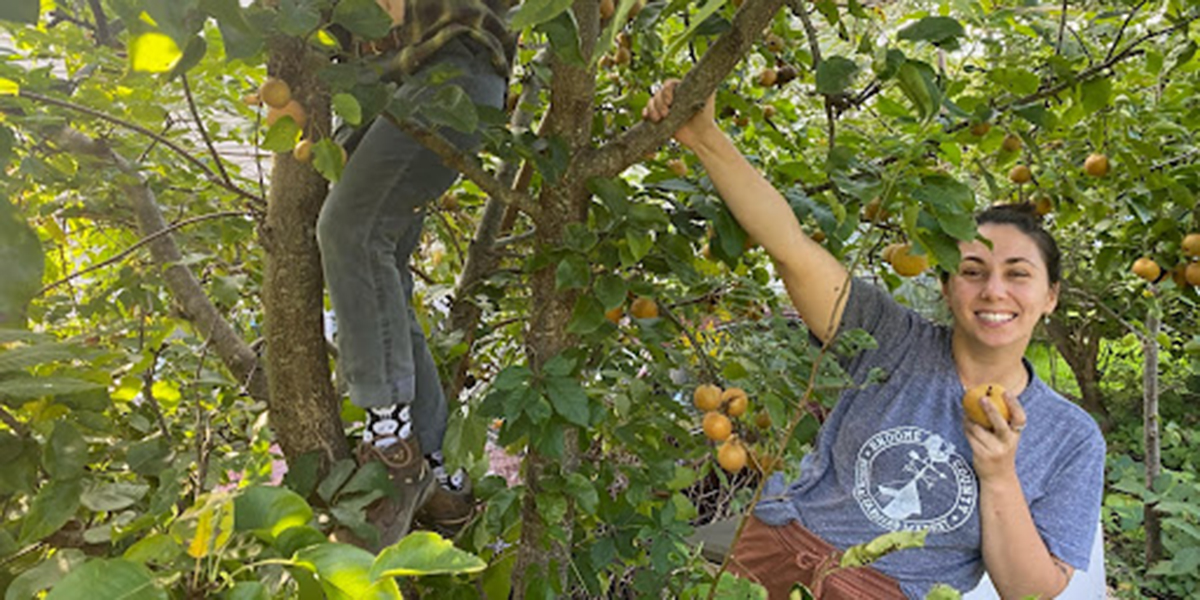Eliana Epstein ’18, MS ’20, strengthens local food systems

Eliana Epstein ’18, MS ’20, has had a love of gardening and nature for as long as she can remember. Now, as a Binghamton University alumna, she calls upon that love to give back to the Binghamton community.
Epstein graduated from the University in 2018 with a bachelor’s degree in sustainable development planning, a degree that she created through Harpur College’s Individualized Major Program. In 2020, she received her Master of Science in Sustainable Communities. Since graduating, Epstein, who is originally from the Hudson Valley region, has stayed in the Binghamton area after carving out a home for herself in the community.
Her love of gardening was originally inspired by her mother, who was one of the first people to teach her the importance of growing her own food. Her grandmother also taught her the importance of feeding people who are food insecure.
“I was lucky enough to always have a garden as a kid,” Epstein said. “We grew food and went to farmers markets, so I was always aware of food systems, but I didn’t have the words for it until college.”
Now, as a farm-to-school educator with the Sidney City Schools, she gets to pass along her love of gardening and fresh food to the next generation.
“I manage two pretty big gardens and teach kids about gardening, food justice, cooking, permaculture, whatever they’re interested in,” Epstein said. “It’s a really wonderful and rewarding job.”
Alongside her work with Sidney City Schools, Epstein manages the Downtown Binghamton Courtyard Market, a farmers market that helps bring fresh food to the downtown area. She is also a founding member of Binghamton Food Rescue (BFR), an organization that takes unsold food from local farmers markets and distributes it to local people who otherwise would not have had access to that food.
“When I was in college, a few weeks after BFR started, I saw someone giving away food outside of the Salvation Army, and they were giving away kale,” Epstein said. “I thought that was the coolest thing ever, so I joined. And then I went super hard into that world and learned a lot about food justice and food systems after that.”
Epstein continued to pursue these interests through classes she took at the University, with instructors such as George Homsy, an associate professor of environmental studies, and the late Dick Andrus, the founder of Binghamton University’s environmental studies program, who retired in 2018 and died in 2020..
Some of these classes, such as Homsy’s SUST 500 Sustainable Development I and SUST 510 Sustainable Development II, are designated as community-engaged learning courses by the Center for Civic Engagement (CCE), which aids and supports faculty by providing programs, tools and resources for instructors to incorporate community engagement into their teaching, research or scholarship.
Community engagement enables educators like Homsy to connect their students with the real world, learning skills they can use outside of the classroom and making positive impacts on the local community.
“In my classes, we often have a project for a community client — Broome County Transit, the Town of Triangle, the Office for the Aging, to name just a few,” Homsy said. “On one level, these projects allow students to practice being professionals. But just as importantly, it exposes students to the diversity of people within a community. I hope that we are training future sustainability leaders. Leaders must understand that not everyone they deal with has their same experience or life circumstance. Public servants must be servants to all and it requires understanding the range of people impacted by different projects.”
Through incorporating community engagement into their courses, faculty are better prepared to connect students to the community and connect with the students themselves.
“My biggest takeaway from my time at Binghamton was meeting professors who do really cool things, and who I could look up to as role models,” Epstein said. “Besides helping me with my studies, they showed me what kind of work they were involved in outside of the classroom, too.”
Homsy brought in speakers to his classes, some of whom were alumni with the sustainable communities program, to show his students what their careers once they graduated could look like. He also helped Epstein find a physical space for BFR through a community organization, North of Main (NoMa), which is dedicated to revitalizing Binghamton’s West Side.
One of the organizations that Epstein is currently involved with, Volunteers Improving Neighborhood Environments, INC. (VINES), is currently working to give back to the Binghamton community by creating a memorial in honor of Andrus.
“Half of [Andrus’s] property was donated to VINES to be turned into a community space,” Epstein said. “He loved the idea of a community orchard and always wanted one in Binghamton, so VINES is turning his property into an orchard. I’m part of the team working on that, which is so exciting and a wonderful way to commemorate his life.”
